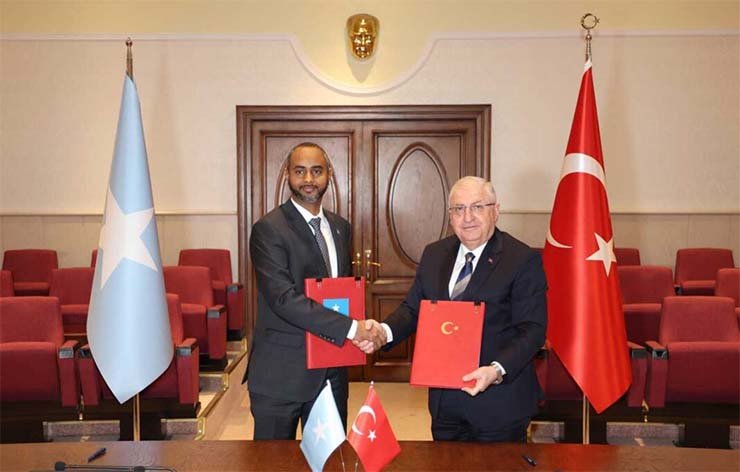Türkiye is set to send naval support to Somalia following the agreement between the two countries to explore oil and gas in Somali waters. In July, Türkiye’s President Recep Tayyip Erdoğan introduced a motion in the Turkish Parliament seeking authorisation to deploy Turkish forces in Somalia’s territorial waters.
This move comes on the back of the agreement between Türkiye and Somalia concluded in February this year. Under this agreement Somalia has authorised Türkiye to build, train and equip the Somali navy and defend its territorial waters amid the tensions with Ethiopia.
In turn, the Türkiye-Somalia naval agreement could be considered to have resulted from the friction between Somalia and Ethiopia. In January this year, Ethiopia signed a Memorandum of Understanding (MoU) with Somaliland, a breakaway region of Somalia. This MoU provides for the landlocked Ethiopia to get 20 kilometres direct sea access alongside Somaliland’s coast over next five decades. Somalia termed Ethiopia’s actions as the violation of the former’s sovereignty and called for the termination of the MoU with Somaliland.
Just prior to the maritime agreement with Somalia, Türkiye started mediations between Somalia and Ethiopia to defuse the tensions between the two African neighbours. However, Ethiopia’s reluctant approach has apparently caused Türkiye to accelerate its deal with Somalia.
Türkiye’s new naval agreement with Somalia highlights its strategic ambitions in the Horn of Africa. By providing military support and training to the Somali navy, Türkiye aims to counter the influence of Gulf States like the UAE and Saudi Arabia while enhancing its geopolitical footprint in the region
Türkiye’s naval cooperation deal with Somalia builds upon the former’s continually growing engagements in Africa. Since 2005, Africa has received special attention in Türkiye’s foreign policy. Particularly under Erdoğan’s presidency, Ankara has been proactively engaging with the African countries. Having first focused on soft power like humanitarian aid, education and culture to forward its ties with Africa, Türkiye later sought to strengthen its military foothold in the region. As regards to Somalia, it received Türkiye’s assistance during the famine of 2011. In 2017, Türkiye established Camp TURKSOM in Mogadishu which is Türkiye’s largest overseas military training facility.
Türkiye’s strengthening foothold in Africa, particularly in Horn of Africa needs to be considered from two wider perspectives.
One is expanding Türkiye’s footprint in the Indian Ocean Region (IOR). In addition to Somalia, a resident power in the IOR, Türkiye’s deep engagements with Pakistan and the Maldives further facilitate Türkiye’s manoeuvring in this region.
Pakistan remains Türkiye’s most important partner in the IOR. The two countries enjoy close diplomatic as well as strategic ties. In the strategic sphere Türkiye has diversified engagements with Pakistan that range from modernisation of Pakistan’s F-16 programme to supplying naval vessels to the Pakistan Navy. In particular, Türkiye is one of the prominent partners of Pakistan in the maritime domain. Some of the major areas of the Türkiye –Pakistan maritime cooperation include building a logistics vessel PNS MOAWIN, upgrading Agosta 90-B submarines and construction of four corvettes and two off-shore patrol vessels (OPVs) under the MILGEM project.

As for the Maldives, this island nation in the Indian Ocean has been attempting a recalibration in its foreign engagements following the election of Mohamed Muizzu as president in November 2023. An indication of this recalibration was that Muizzu chose Türkiye as his first destination for a foreign visit, marking a shift from the convention where the newly-elected Maldivian president usually travels to India on a first foreign visit. Muizzu, being pro-China and a part of the ‘India Out’ campaign in the Maldives, indicated a shift in the Maldives’ foreign policy by visiting Türkiye. This step was a clear message that the Maldives was seeking to reduce its dependence on India.
Besides, during Muizzu’s visit, Türkiye signed a defence deal with the Maldives worth $37 million. Under this deal, Türkiye will sell military drones to the Maldives that would be employed in patrolling the high seas. In March this year, the Maldives inducted Turkish-made Bayraktar TB-2 drones into service and one of the drones also completed its maiden patrol. The defence deal with the Maldives is a major step for Türkiye to enhance its presence in the IOR.
Two, outside of the region-specific diplomacy, Türkiye’s manoeuvring across North Africa, the Horn of Africa and the IOR has a subtle aim of gaining a leadership position among the Muslim countries. Türkiye has always tried to project itself as a leader of the Muslims and the Islamic world. Türkiye’s ambition to assume leadership of the Muslim world has been one of the causes of its long-standing friction with the Arab world, particularly Saudi Arabia and the UAE.
The naval deal between Türkiye and Somalia is part of a broader effort to mediate and stabilise the region. With Ethiopia’s recent agreement with Somaliland causing friction, Türkiye has stepped in to support Somalia, reinforcing its role as a peacemaker and a key player in the Indian Ocean Region
For its part, the UAE, as also Saudi Arabia, has been a major player in the Horn of Africa. The Horn of Africa, located across Red Sea from Yemen, has been a region of strategic interest for the Gulf States. The role of the Gulf States, particularly the UAE, has been proactive in this region. Since the 2010s, the UAE has strengthened its military ties with the countries in the Horn of Africa. This development has come on the back of the UAE’s robust economic ties in the region. The UAE engages in military cooperation at different levels which, apart from forwarding its own strategic interests in the region, include counter-terror cooperation and capacity-building in the form of providing training to the military personnel of the countries in the region.
As mentioned earlier, Türkiye’s engagements with the Horn of Africa were initially benign in nature focusing on providing humanitarian assistance. However, in the past few years, Türkiye has been diversifying its ties in the region by concentrating on military cooperation. Through greater outreach to the Horn of Africa, Türkiye is looking to counter the Gulf States’, and particularly the UAE’s, influence in the region. Türkiye is not just trying to match the Gulf States in terms of military cooperation with the countries in the Horn of Africa; it is also trying to replicate the Gulf States’ role as peacemakers in the region.
Even as the naval deal with Somalia was in the offing, Türkiye tried its hand at establishing peace between Somalia and Ethiopia. In July, the foreign ministers of Somalia and Ethiopia visited Türkiye in an attempt to resolve a dispute between the two countries. Previously, the UAE and Saudi Arabia had played this role in case of disputes between Eritrea and Ethiopia.
The recent naval deal with Somalia not only pushes forward Türkiye’s geopolitical objectives in Africa, this deal is also a basis for Türkiye’s wider aspirations that include greater interactions with the IOR countries and the pursuit of leadership position among the Muslim countries across different regions.
–The writer is an Independent Political Analyst and Researcher based in Vadodara. Follow him on Twitter: @NiranjanMarjani. The views expressed are of the writer and do not necessarily reflect the views of Raksha Anirveda
–The writer is an Independent Political Analyst and Researcher based in Vadodara. Follow him on Twitter: @NiranjanMarjani. The views expressed are of the writer and do not necessarily reflect the views of Raksha Anirveda






